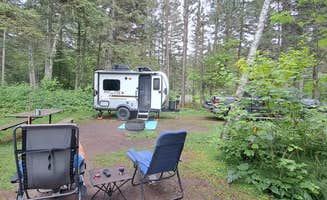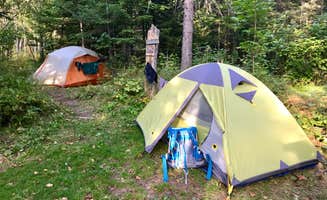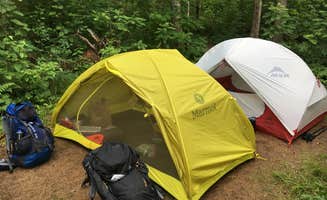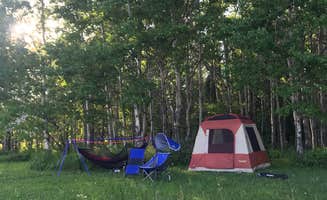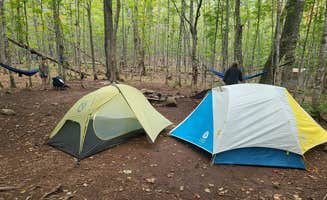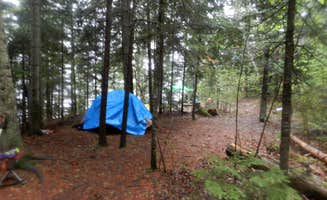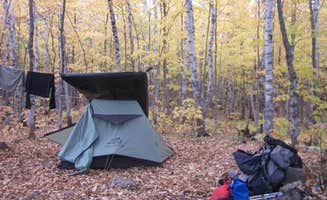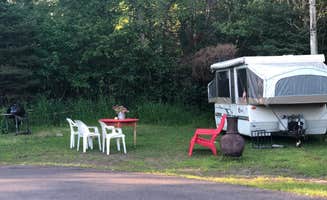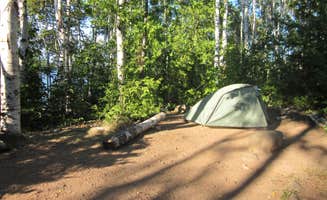Camping options near Grand Portage, Minnesota range from rustic forest campsites to lakeside accommodations with views of Lake Superior. The area sits at the northeastern tip of Minnesota's Arrowhead Region, with elevations ranging from 602 feet at the lakeshore to over 1,800 feet at inland locations. Winter temperatures often drop below 0°F while summer highs typically reach the mid-70s with frequent fog along the shoreline.
What to do
Hike to Devil's Kettle: Follow the well-maintained trail at Judge C. R. Magney State Park Campground to see the unusual waterfall where half the water disappears into a rock formation. "Be warned lots of stairs but excellently maintained. The trail to Devil's Kettle was a nice hike," notes Scott G.
Fish for northern pike: McFarland Lake offers productive fishing in a remote setting with boat access. According to Josh M., visitors can expect "northern about 2 feet in length but skinny" while enjoying the pristine waters of this backcountry lake.
Stargaze at night: The rural setting allows for excellent night sky viewing away from city lights. "We are stargazers and really enjoyed the night sky, it was nice and dark, no light pollution," reports camper Kt D. about their experience at Hungry Hippie Campground.
What campers like
Lake views: Sites overlooking Lake Superior provide scenic vistas throughout the day. Susan A. from Grand Portgage Lodge & Casino shares, "We have what I consider the best site in the park (#12). We have a great view of the harbor and the lake. The sites are really spaced out."
Access to town: Staying close to Grand Marais means easy access to local amenities. "The aspect of this campground we liked the best was that we could walk to town," notes Nancy W. about the Grand Marais Campground & Marina.
Forest solitude: Camping in secluded areas of Grand Portage State Forest provides privacy and quiet. Elizabeth shares about Devilfish Lake, "There are several sites, lots of privacy. Road up from North Shore was a bit rough in places, but destination is worth it."
What you should know
Reservations recommended: Most campgrounds fill quickly during peak season. The Grand Marais Campground often reaches capacity, especially on weekends.
Limited facilities at remote sites: Many forest campsites offer minimal amenities. "This is primitive camping - no electricity. There's water available. No dump. Dumpsters for trash," explains Cynthia K. about Judge C. R. Magney State Park Campground.
Variable weather conditions: Weather along Lake Superior can change rapidly, with temperature drops of 20 degrees possible in summer when winds shift. Pack layers even in July and August.
Cell service limitations: Many camping areas have poor or no cellular coverage. "There is no cell service. There is a large gas station next to the marina where you can make phone calls at a pay phone," advises Matt S.
Tips for camping with families
Consider campground layout: Some campgrounds have better layouts for families with children. Sara P. notes about Judge C. R. Magney: "The sites were so close together and I felt bad for the people who were next to my sometimes rambunctious kids. There were a lot of trees for our hammock, though!"
Look for swimming options: Some lakefront sites offer safe swimming areas for children. Steph H. recommends Esther Lake Campground: "The lake is clear and swimmable... There is a very short trail to a lovely rock outcrop that slides into the lake."
Pack for temperature swings: North Shore temperatures can vary widely between day and night. "It's mid June and the high is 60," reports Rico R. about camping near Lake Superior.
Tips from RVers
Site size considerations: Many campgrounds have limited space for larger rigs. Duncan G. explains, "There are standard and premium sites. The premium sites have a better view of the marina and the lake... The hookups all work well."
Hookup availability: Check what utilities are available before booking. "It was about $45 for an electric site. I think tents were about $20. While it did come with the amenities mentioned above, there is no privacy at any of the sites," shares Amy G.
Access road challenges: Forest roads to remote sites can be difficult for larger RVs. Cynthia K. warns: "The road is also very primitive - trees will rip off the air conditioners in your 45 footer! The sites are suitable for tents & small trailers, popups, truck campers, camper vans."



